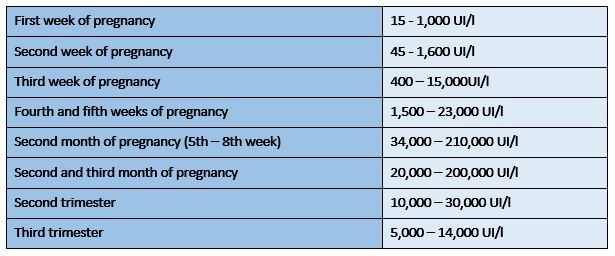
The two week wait is the period of time it takes from when a patient undergoes fertility treatment (either artificial insemination or in vitro fertilisation) until the day the treatment results are obtained. The result can be either positive or negative. This wait usually lasts from 9 to 14 days, depending on when the embryo transfer was done. It’s a time of hope but also stress, which can cause great anxiety in patients.
Understanding the two week wait: what is it?
The two week wait (often abbreviated as 2WW) refers to the period between an embryo transfer and the subsequent blood test to measure hormone levels. These will indicate if pregnancy has been achieved. This period is also experienced following artificial insemination treatments.
Patients frequently call this the “beta-wait” because the hormone measured in the blood test is beta-hCG (beta human chorionic gonadotropin).
It is often thought that a pregnancy test is enough, but this is not the case. A pregnancy test will not always detect a positive pregnancy and could fail by registering a false positive. Therefore it is crucial to have a pregnancy confirmed by a blood test, and to have checks done by a gynaecologist.
How do we know if the beta hCG is positive or negative?
We will know if the beta is positive or negative by analysing the amount of hCG present in the blood measured by the beta-hCG hormone, after which it’s named. The hCG is a very important and necessary hormone for the strength and progress of the pregnancy. Scientifically known as human chorionic gonadotropin, this hormone is produced by the embryo when it is in the state of trophoblast (group of cells present in early pregnancy), which then evolves to the placenta.
6 days after the fertilisation of the egg, the hCG hormone can be detected, as it will have reached the mother’s blood, and its levels can be measured through a blood test. The longer we wait, the higher the hCG value will be, since it increases until it reaches its peak during the second month of pregnancy. If the result of the blood tests shows that the beta hCG is less than 5 IU/l, it means that there’s no sign of a pregnancy.
On the following table are the normal guidelines for hCG levels during the course of pregnancy:
Common symptoms during the two week wait
As we explained in another article on this blog, some women experience symptoms during the two week wait, while others feel absolutely nothing. It’s important to note that even if the embryo has implanted, it’s such an early stage of pregnancy that symptoms may not appear.
Here are some of the signs that can be detected:
- Cramps or discomfort similar to menstrual pain
- Breast tenderness
- Fatigue
- Mood swings or emotional fluctuations
There may also be slight bleeding, which should not be confused with a period. This is implantation bleeding, which occurs when the embryo implants and breaks some capillaries.
Coping Strategies to Manage Anxiety
It’s inevitable to feel nervous and anxious during this waiting period, but experts recommend maintaining a positive attitude. For instance, it’s advisable for the patient to consider herself pregnant, as anticipating a negative result doesn’t help at all.
Emotional Support: Talking to Your Partner and Loved Ones
You can choose whom to share your situation with: a family member, a friend, or your partner. However, try not to let the two week-wait dominate your thoughts or conversations. Set a mental time limit each day to think about it. As we will suggest later, find ways to keep yourself entertained, whether through your routine or activities that bring you well-being.
What to do while waiting: tips and activities
The first advice you should follow if you’re waiting for your beta results is to avoid searching for information on the internet. Don’t seek out symptoms, testimonials, or other information. Every body reacts differently, so what applies to some women may not apply to others.
If you have questions, it’s best to consult with your medical team. Information is the best tool for dealing with uncertainty.
Just two weeks? It feels like years!
The two week wait can feel like forever, so if you are in this situation it’s good to try and face it with optimism, so that you can deal with the wait in a more positive way and help yourself to relax when result time comes.
Try to stay in your day-to-day routine, working, studying and planning the weekend, and forget about the actual dates. Here are some suggestions to occupy your time during the wait:
- Engage in hobbies that make you feel good: reading, listening to music, taking walks, watching movies.
- Look for different activities to do during these days and give yourself time to enjoy them.
- Take walks or engage in moderate exercise.
- Meet up with friends if you feel comfortable in their company.
During the two week wait, you don’t need to rest, so you should lead a normal life. Consider whether it’s preferable to continue working or take advantage of the time to go on a relaxing vacation.
When to Take a Pregnancy Test
We know it’s hard to resist the urge, but you shouldn’t take a home pregnancy test before your blood test day. These tests measure hormone levels in urine, which can lead to misleading results. False positives or false negatives are common because the hormone may not be measured at the appropriate time.
Therefore, to answer the question “when to take a pregnancy test”, the most advisable approach is to wait for the hormone blood test to obtain a more reliable result.
What happens after a positive beta hCG?
The result of a beta test is considered positive when more than 5 mIU/mL is detected in the blood analysis. However, typically, after 13 days post-implantation, the value should be around 50 mIU/mL.
The hCG hormone doubles approximately every 48-72 hours until the end of the first trimester. Therefore, in the case of a doubtful value, the test should be repeated after 2-3 days.
The medical team will evaluate the beta result, and if it’s appropriate, the patient should undergo a first follow-up ultrasound about 15 days later. This will confirm the number of embryonic sacs and their correct placement in the uterus.
Handling a negative beta hCG result
If the beta value is lower than expected based on the date, the test is considered negative. This indicates that there hasn’t been a pregnancy.
Depending on the result, if it’s too low, the blood test can be repeated to check for any increase in values. If after 30 days of pregnancy the beta value has not sufficiently increased, then it may indicate something is not right. It could be, for instance, an ectopic pregnancy, which occurs when the fertilised egg implants itself outside the uterus. Situations like this occur in one out of every 50 pregnancies.
If there’s no pregnancy, the specialist will evaluate the case to determine what might have occurred and establish the next steps. Psychologically, it’s considered a loss for which specialists recommend undergoing a grieving process. At IVI, we have Emotional Support Units in our clinics to provide the necessary information and assistance to handle a negative beta result.






3 Comments
BETA HCG LEVELS AT 15TH WEEKS ARE 119822 MIU/ML
KINDLY SUGGEST THAT WHETHER IT IS IN NORMAL RANGE
THANKS & REGARDS
Dear Kumar,
Please contact us here so one of our doctors can answer your questions.
11 th day after IUI . checking beta HCG 12.55 good sign